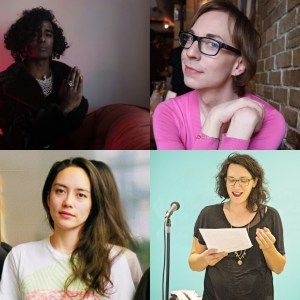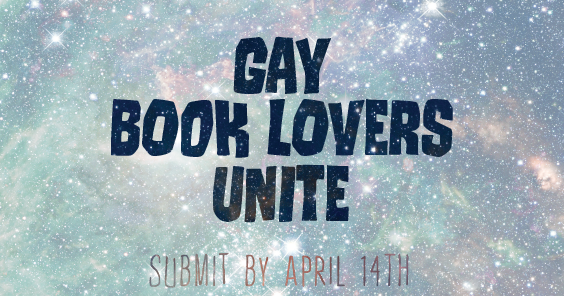Metonymy Press is a Montreal-based press that publishes literary fiction and nonfiction by emerging writers. They try to reduce barriers to publishing for authors whose perspectives are underrepresented in order to produce quality materials relevant to queer, feminist, and social justice communities.
Metonymy Press is a Montreal-based press that publishes literary fiction and nonfiction by emerging writers. They try to reduce barriers to publishing for authors whose perspectives are underrepresented in order to produce quality materials relevant to queer, feminist, and social justice communities.
Metonymy currently has a special open call for submissions—Gay Book Lovers Unite. This special project includes a guest jury of authors (jia qing wilson-yang, Kama La Mackerel, Gwen Benaway, and Helen Chau Bradley) and a book deal. Oh, and there’s a $500 prize up for grabs!
Room’s Geffen Semach spoke with Ashley Fortier, co-publisher of Metonymy Press, as well as jia qing wilson-yang, author, musician, and one of the judges for Gay Book Lovers Unite.
ROOM: Metonymy publishes works of authors whose “perspectives are underrepresented in order to produce quality materials relevant to queer, feminist, and social justice communities.” Where did the Gay Book Lovers Unite Project stem from outside of the Metonymy Press values?
Ashley Fortier: The project seeks to further actualize that mandate. Metonymy is just two people, and no matter how diligent we are regarding gaps we recognize in publishing, we’re always going to miss things, obviously. By drawing on the perspectives of others who are embedded in queer lit in various ways, and whose lived experiences differ from mine or Oliver’s, we hope that we can continue to build a catalogue that reflects an increasingly wide range of stories.
As publishers, despite the micro scale we’re operating on, we have some inherent power in deciding what goes to print. This process might help acknowledge and mitigate that reality.
ROOM: It’s exciting to see this kind of project—to be extended the opportunity to have published authors review your manuscript. Why did you feel the need for this kind of project within the CanLit community?
jia qing wilson-yang: I feel that the need for this kind of project is in many ways to move beyond the CanLit community to voices that aren’t included in what we think of as “CanLit.” The jury is made up of queer and trans racialized folks. We all have different relationships to the Canadian settler state, but none of us have voices that are typically taken up by what I think of as “CanLit.” This kind of project is a chance for a dialogue between QTBIPOC writers about what we want to see reflected in literature.
ROOM: Metonymy Press—founded in 2014—is still quite young, but has already published some impressive works, include Small Beauty by jia qing wilson-yang (congratulations, by the way). What do you envision for the future?
AF: We’re blown away at the positive reception—largely due to our authors—our press has received in such a short period. We’re thrilled about the reach we have after such a short time, and we want to keep working responsibly and with care alongside our authors.
We’d like to continue to collaborate on projects like Gay Book Lovers Unite.
We’d like to make all our titles available as e-books as well as in print and are looking into other formats such as audiobooks.
We hope to host more regular literary events in Montreal and continue to carve out space for queer and trans emerging writers here and elsewhere.
If we can get one or two more grants along the way, that’d be helpful too!
ROOM: In respect to the Gay Book Lovers Unite Project, what kinds of manuscripts are you looking for? What gets you excited about fiction or creative non-fiction?
jqw-y: What excites me about fiction and creative nonfiction is reading work that helps me reimagine the world I live in or helps me imagine the world I want to live in. I’m hoping that QTBIPOC folks are willing to trust us with their stories, because our stories are extracted and our lives are devalued. I’m hoping to read manuscripts that complicate the social order we live in, either through showing people managing and working to keep it together to or imagining futures and changing social contexts.
ROOM: jia qing wilson-yang is a published author with Metonymy and will be active on the jury of the Gay Book Lovers Unite project—how were others on the jury chosen?
 AF: We had thought of a couple dozen people who we thought would make up an attentive jury, because we weren’t sure who would have the time or interest! The ones we chose were based on who we reached out to first and who was available.
AF: We had thought of a couple dozen people who we thought would make up an attentive jury, because we weren’t sure who would have the time or interest! The ones we chose were based on who we reached out to first and who was available.
Yes, jia qing is one of our published authors, and an incredible writer, musician, and community organizer in general. Her poetry was in the Room Women of Colour issue last year.
Gwen Benaway is a talented Two-Spirited poet. She and jia qing were both nominated for a Writers’ Trust of Canada award last spring. She has reviewed our books and helped get the word out about Metonymy in the context of posts for CBC Books about her own experience as a trans woman in the CanLit scene.
Kama La Mackerel is based in Montreal and organizes a lot in community contexts overlapping with those we’ve both worked in. She also was hugely supportive in getting jia qing to Montreal to promote her writing before Small Beauty was even released.
We met Helen Chau Bradley through the Queer Between the Covers book fair collective years ago, and she also works at a local bookstore, Librairie Drawn & Quarterly, where she currently hosts the Reading Across Borders book club. So we got to know her in the context of her being a discerning reader and amasser of books in Montreal, which is important on a submissions jury!
ROOM: What is the role you hope this project and Metonymy Press will play in the literary and publishing communities with regards to inclusivity?
AF: I guess the term “inclusivity” makes me cringe a bit, because it kind of reinforces a divide between who gets included and who gets to do the including. But ultimately what we aim to do is carve space for writers on the margins to write on their own terms, without having to fit some kind of checkbox or tokenized idea of what existing CanLit scenes expect them to do.
What we prioritize and have the capacity for, because we’re such a tiny press, is nourishing the queer and trans and feminist and social justice communities we’re part of (or nearby) with narratives that resonate with them. If the broader literary scenes appreciate them too, all the better.
ROOM: For both of you—do you consider either of the acts of running a publishing press focused on inclusivity, or of publishing a novel on the topic of being a trans woman, a kind of activism? Why, or why not?
AF: I think cultural production by and for oppressed communities has always been and continues to be an important component of resistance movements because it’s about fighting against erasure and assimilation.
With that said, although Metonymy is still in the “getting by” stage of publishing, we do operate within capitalism, so I hesitate to call our work “activism.” We’re striving to amplify the voices of people who do important activist work, though.
jqw-y: Yes. The sharing and distribution of knowledge and experience that disrupts the way we take for granted what is normalized, is a kind of activism. It can be inspiring, hope giving, and spiritually sustaining, which we need to keep going, to continue to disrupt, however we might do that in our daily lives. But, it’s vital to remember that art is just a representation of the changes we want to see in the world, a reminder of a direction to go in, not necessarily the actual movement to where we need to be. Activism is a catch all word, and I don’t want my writing to be taken up as anything close to the scale of the work that other folks are doing to make the non-fiction we live in a place free from white supremacy or to decolonize and reclaim/return the lands Canada has stolen to their rightful caretakers.
ROOM: What advice do you have for those sending in bios and manuscripts in terms of details that may help them grab the notice of the jury of writers?
jqw-y: For me, it’s so important that I know who is writing what I’m reading. I want to know where authors are coming from, I want to know what stake they have in what they are writing. Who are you and why are you writing what you are writing? Why is it your story to tell?
Metonymy Press is accepting creative fiction and non-fiction (specifically, short story collections, novels, novellas, memoirs, and personal essay collections) from anyone residing in so-called Canada, for their Gay Book Lovers Unite competition until April 14, 2017. Interested writers may submit one section (e.g., a chapter, around 20 pages) of a working manuscript, along with a one-page introduction including how you self-identify as well as of yourself as a writer in relation to the piece.














